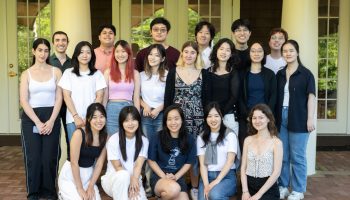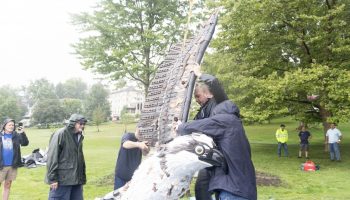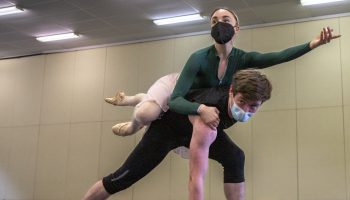
Strung to the melodies of the world’s most well-known art songs are stories of war and peace; love and loss. In this week’s Voice Program recital, the poetry behind a French song will transport audiences to the battlefield, an English piece to face the regret of time one can’t get back, and an Italian song on a journey of following love no matter the cost.
“You have to sit with it — the meanings between the lines,” said Gabriela Linares, a School of Music student.. “Sometimes the poems are so complex they mean different things to different people. Finding what’s personal to you takes a song from good to great.”
Eight students from the Chautauqua School of Music Voice Program will perform in their second recital of the season at 7 p.m. EDT on Wednesday, July 22, on the CHQ Assembly Virtual Porch.
Cesar Parreño, a student from the Juilliard School, will perform two French pieces, starting with Olivier Messiaen’s 1936 “Paysage,” which translates to “landscape.”
“It’s about the beauty of a landscape you used to go to with your loved one,” Parreño said. “Wherever she may have gone to, you wish you could be there with her, so you spend your time remembering the beauty of the earthly places you have been together.”
However, Parreño said the piece is not sad in tone, but rather laced with somber notes and hints of hope.
“The music is sweet and tender and a little bit joyful,” he said. “There is a sense that you know you’ll be with your loved one again, someday, in time.”
Next is Francis Poulenc’s “C,” the first piece from his 1943 “Deux Poemes de Louis Aragon.” Aragon, a French poet, is considered to be a founder of the surrealist movement. Written during World War II, “C” mixes sentiment, nostalgia, and passion into a heartrending statement.
“It’s a very abstract poem,” he said. “It has a very somber, ghost-like sound to it. The ambience is impossible to explain, you have to listen to feel the depth.”
Matthew Goodheart, a student from Cincinnati College Conservatory of Music, will perform three pieces. The first two are in Italian, including Francesco Paolo Tosti’s “Ideale,” a “must have” in any tenor’s repertoire. “Ideale” is the most emotional of his three songs and details the emptiness a person feels when love is gone, according to Goodheart.
“It is about someone that you love, how close you were and how you followed that person for as long as you can remember and now they are gone,” he said. “You learn they were the ideal person for you, but you can no longer have them.”
The somber tone of the song is coupled with words closely associated with happiness, including “rainbow,” “peace,” and “radiance.” Goodheart said despite the word choice, the song is “quite sad” throughout.
“There is really no redeeming happy quality to it.” Goodheart said. “It’s the hardest of the songs that I sing, too, because you have to find the fine line between using your emotion and singing it well on a technical level.”
Next is Franz Schubert’s “Halt!” from “Die schöne Müllerin,” a song cycle based on poems by German poet Wilhelm Müller.
“It’s very high energy the whole time and extremely fast paced, but I love it because it sits in a place in my voice that I feel really comfortable singing,” he said.
Next is Michael Head’s “Sweet Chance that Led my Steps Abroad,” based on a poem by William Henry Davies, “A Great Time,” first published in 1914.
“It’s about thinking about things that have happened in your life that are so great, but maybe in the moment you didn’t realize just how great they are,” he said. “Looking back, though, you realize that moment will never happen again, making an ordinary moment feel special.”
Linares, a student from Oberlin Conservatory, will perform “When I am Laid in Earth,” an aria from the opera Dido and Aeneas by English composer Henry Purcell. In the opera, the characters grapple with themes of death and leaving love behind. This particular aria comes at the end of the opera when one character flings herself toward death after being abandoned by her true love.
When you find what you connect with, you can convince the audience you are telling your own story, not someone else’s through a song that doesn’t belong to you,” Linares said. “That’s when they believe in it the way you believe in it.”
She will also perform Antonin Dvořák’s “Zigeunerlieder” Op. 55. “Zigeunerlieder” was composed based on a collection of poems, Gypsy Melodies, by Czech poet Adolf Heyduk. The poems are grounded in folk verse, particularly that of Slovak and Czech. Linares said there is an emphasis throughout the piece on freedom as something to be valued above all else, one she feels connected to within her “uncertainty of identity.”
“Dvořák was comparing his people to gypsies and how they were trying to make the best of their situation, yet could never grasp not being able to have their own land,” she said. “That really connected with me because I am from Puerto Rico and my people feel alienated all the time as we go back and forth between feelings of belonging in the U.S.”
In passionate themes of war, peace, love and loss, Linares said connections can be made “spanning centuries.” According to her, those connections are where the “magic happens.”
“When you find what you connect with, you can convince the audience you are telling your own story, not someone else’s through a song that doesn’t belong to you,” Linares said. “That’s when they believe in it the way you believe in it.”




